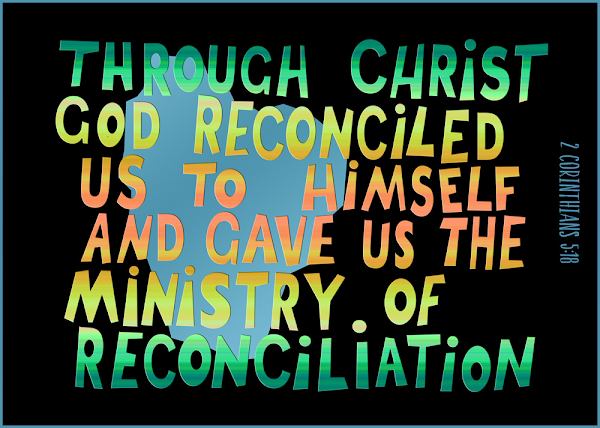2 Corinthians 5:16-21
16From now on, therefore, we regard no one from a human point of view; even though we once knew Christ from a human point of view, we know him no longer in that way. 17So if anyone is in Christ, there is a new creation: everything old has passed away; see, everything has become new! 18All this is from God, who reconciled us to himself through Christ, and has given us the ministry of reconciliation; 19that is, in Christ God was reconciling the world to himself, not counting their trespasses against them, and entrusting the message of reconciliation to us.
20So we are ambassadors for Christ, since God is making his appeal through us; we entreat you on behalf of Christ, be reconciled to God. 21For our sake he made him to be sin who knew no sin, so that in him we might become the righteousness of God.
Mid-Lent: "Rejoice"
Thursday was the mid-point of Lent. Because every Sunday celebrates Easter, all six Sundays are in but not of Lent; however, the fourth Sunday especially is a time of respite and refreshment. Each Lenten Sunday has a unique name based on the first word of the traditional Latin introit; this fourth Sunday is Laetare, "rejoice." Rather than penitential purple, the liturgical color for vestments and paraments is lighter, brighter rose that we also can use on Advent 3.
Texts for the Laetare introit come from Isaiah 66:10-11 and Psalm 122:1
Isaiah 66:10 "Rejoice with Jerusalem and be glad for her,
all you who love her;
rejoice greatly with her,
all you who mourn over her.
11 For you will nurse and be satisfied
at her comforting breasts;
you will drink deeply
and delight in her overflowing abundance."
Psalm 122:1 I rejoiced when they said to me,
"Let us go to the house of the LORD."
Reflecting
The gospel for today includes Luke 15:11-32, the waiting father, prodigal younger son, resentful older brother parable. In the canonical gospels, only Luke includes this story. The second reading from 2 Corinthians also is about reconciliation, forgiveness, new beginnings, restorations. I love the idea of our being baptized into Christ and becoming a new creation—"from now on"!
The apostle Paul tells us way back when (maybe before Paul got into his high Christology?) people considered Jesus only from a human perspective, "according to the flesh," which isn't bad at all, but it's low-level basic, first rung of the ladder. We know Jesus Christ as fully human and fully divine. Paul parallels looking at Jesus in a more comprehensive way with considering each other more completely. Surprisingly, Paul does not use the word disciple or apostle or follower of Christ; he says we are "in Christ." That organic incorporation into Christ begins with our baptism. Well, it actually began 2,000 years ago. Because we all are "in Christ," we are more than just human, too!
2 Corinthians 5:18, 19, 20
The word Paul uses for reconcile, reconciliation is not so much about making everything even and equal as in settling financial or other accounts; it's closer to a new beginning on common ground, creating a commonwealth with common cause.
The Greek here for "world" – cosmos – means more than simply planet earth we live on; it refers to everyone and everything. All people, plants, animals, revise, oceans, deserts—everyone! everything! all creation!
An ambassador, [envoy, representative] gets sent out of their own country to represent it in a foreign country. God calls us out and sends us out to do the same ministry of reconciliation Jesus did!

No comments:
Post a Comment